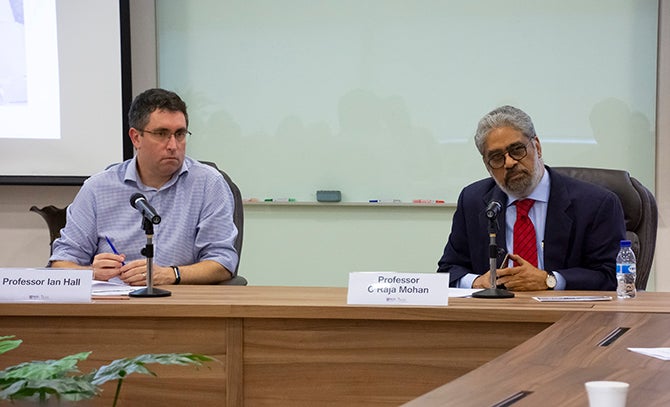| Description: |
Professor Ian Hall teaches International Relations at Griffith University, Queensland, Australia, and is the Deputy Director (Research) of the Griffith Asia Institute was invited to ISAS for a Seminar on the topic ‘Narendra Modi’s Religious Diplomacy and the Reinvention of Indian Foreign Policy’ as he is currently publishing an upcoming book on Modi and the Reinvention of Indian Foreign Policy. This session was moderated by Professor C. Raja Mohan, Director of Institute of South Asian Studies (ISAS). Director C. Raja Mohan opened the seminar by introducing the topic to the audience and said Modi’s Foreign Policy has been widely discussed but there has been less discussion on the aspect of religious diplomacy. The participants comprised of ISAS research staff and members of the public. Prof Ian Hall began his talk with a picture from World Cultural Festival organised by the spiritual/religious organisation Art of Living inaugurated by PM Modi last year. He stated that the event such as this, with over 750 key politicians across the world present, promotes India’s soft power under the theme “One World Family”. Prof Ian then outlined the five pillars of PM Modi’s foreign policy strategy according to Ram Madhav, who drafted the BJP’s 2015 policy document. These are samriddhi (economic prosperity), suraksha (national security), samman (upholding the dignity and honour of Indian citizens and expats), samvad (dialogue and engagement), and sanskriti (culture and civilizational links). He observed the fifth pillar sanskriti is used extensively in PM Modi’s foreign policy. He observed that PM Modi made the cultural references on global stage such as the Shangri-La Dialogue. This means the approach of viewing the world is based on culture-culture than society-society. On the topic of public diplomacy, Professor Ian Hall observed there has been a rise in campaigns to engage more deeply with the public under the Modi government. While the last three governments have all engaged in public diplomacy and soft power campaigns such as Incredible India, the Modi government went one step further by using other means to engage in public diplomacy such as PM Modi himself promoting yoga, using Twitter effectively and holding radio shows to engage with the public. Prof Hall noted PM Modi’s increasing emphasis on cultural and religious ties. PM Modi’s visits to religious sites in Sri Lanka, Buddhist temples in Nepal and mosques in the Arab countries are to emphasise past cultural, intellectual and religious ties. This is part of the Modi government’s emphasis on civil-society diplomatic activities, mostly using India’s diaspora as a quasi-diplomatic tool. The constant cultural engagement is to protect diaspora interests. Prof Hall concluded with Modi’s reinvention of foreign policy outlined in two aspects: a) dropping the Nehruvian idea of foreign policy, b) foreign policy sought through Hindu ideology with religious diplomacy at the centre. Although foreign policy may not help PM Modi win domestic elections, it will certainly create a perception of global leadership among the Indian citizens. Prof Hall’s remarks were followed by a Question and Answer session with the audience. Prof Hall fielded questions on soft power, the concept of religion and state being merged and instrumentalising religion for the purpose of foreign policy and diplomacy. |



